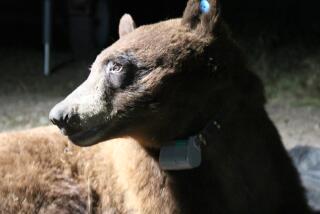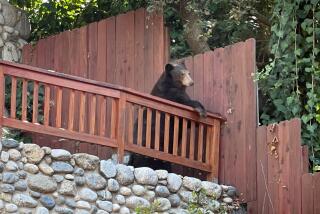Yelling at beasts, scolding campers
Sequoia National Park — Say A FURRY BEAST LUMBERS OUT OF THE WOODS, weighing as much as you do, making goo-goo eyes at your leftover beans and franks. You may be hesitant. You may be scared. You may be inclined to seek out a ranger, whimpering, “There’s a bear. What are you going to do?”
That’s when you need a guy like Yarkovich. Joe Yarkovich. Wears a uniform. Messes with bears.
“It’s very technical,” he likes to explain when the whimpering campers approach. Then Yarkovich, 28 years old, head shaved, weighing in at 175 pounds, starts in with the tough love. He sprints full tilt at a black bear about his size, screaming, “Hey bear! Get going! Get outta here!” and maybe blasting the animal’s face with pepper spray. Hazing, they call it.
So here we go. Night falls as Yarkovich sets off to cruise the tall trees and crowded campgrounds. He is one of three seasonal technicians who chase after a handful of radio-collared troublemaker bears, about three dozen that wear ID tags, and an additional 400 to 500 still naked.
In the back of the truck lie the night-vision goggles, the shotgun and rubber bullets, telemetry instruments, slingshot and pepper balls. On his belt, Yarkovich wears a Mag-Lite and a canister of pepper spray. For hours we prowl, spotting prints at Round Meadow, checking radio transmissions.
Yarkovich warns campers in stern tones that a fed bear is a dead bear and visitors should never leave food or odorous items unattended. In Dorst Campground we hear last night’s report.
“He stood right between those trees,” proclaims 11-year-old Nicholas from Monrovia, pointing to a spot 10 feet from the family tent.
We believe Nicholas. But Yarkovich knows that plenty of campers put out food for bears, then claim innocence. He reminds them that Sequoia’s bears have broken windows and bent door frames, all to reach human food that typically cuts a bear’s lifespan in half. Many rangers say the animals not only recognize uniforms, but individuals.
But where are they now? With midnight approaching, Yarkovich steps from the SUV, pulls on headphones to take a telemeter reading, hears the telltale steady beeps. Then he advances warily into a campground-adjacent forest gully, bushwhacking.
There’s no sound but snapping twigs and fleeing bats, no light but the moon through the redwoods and the dancing beams of two Mag-Lites. The telemeter says “White 68.” Teen female. History of campsite burglary, 150 pounds when the summer began. She’s close, and strangely still.
Yarkovich plays his beam across a redwood trunk nearly broad enough to hide a Hummer. And then the bear tech suddenly stops.
Of course you’d expect a public servant to be compensated handsomely for this kind of thing. You know, $11, maybe $12 hourly. Well, here’s the scandal. Some bear techs earn a full $13 or $14 an hour. Apparently, amid the flying fur and fraying nerves, these guys haven’t realized we’ve got a deficit to tame.
But I’m not here about money. I’m here about the love between bear tech and beast. Maybe the courts won’t recognize it yet, but some things you can’t deny.
“Over the winters, you miss the bears,” Yarkovich’s colleague Louie Long, a three-season bear tech, has admitted.
“They just fascinate me,” Yarkovich tells me, a few minutes before our descent into Blair Witch territory. “They’re incredibly smart animals. We had one who learned how to use his tongue as a third hand to open the latch on bear boxes.”
But this is a complex attachment, what with the teeth-baring and arm-waving, the slingshots and rubber bullets and, in the case of White 56, the occasional bout of cub-thuggery. White 56 is a mama bear. In early summer, as she taught her 15-pound cub the way around the park, White 56 had a brainstorm. As near as the bear techs can tell, she realized that humans were less likely to harm her cub than other bears, which sometimes kill one another’s young. So White 56 started stashing the cub in campsite-adjacent trees. To stop her, Yarkovich had to instill a big fear of man.
So he crept close to the treed cub, hit him with a burst of pepper spray -- “and he made the most adorable face you’ve ever seen. It’s hard to spray a baby animal in the face with pepper. I felt like a bully,” confessed Yarkovich.
There are worse days. Retrieving the 140-pound, “beautiful blond” bear killed by a car over the Independence Day weekend, for instance. Or destroying Yellow 27. A 110-pound male, Yellow 27 discovered in July that campers would leave their food behind if he ran at them. Reluctantly, they shot him.
“When they get scared or feel threatened, they’ll huff and clack their jaws. You can hear their teeth pretty good,” says Yarkovich. “If you act like you want to fight, they’ll basically take off ... unless they’re on food. That’s different. They’re pretty reluctant to get off food, once they’re on it.”
And forest gullies, I’m thinking. How do they behave in forest gullies?
But Yarkovich isn’t talking. He unfreezes and points down with his Mag-Lite. His shoulders slump.
At the end of the beam, next to a dead log, lies a collar. White 68’s collar.
They fall off, Yarkovich explains, if a bear’s neck thickens from weight gain. After a summer of picnic table pilfering, White 68 is not only smarter than the average bear but fatter. Probably about 215 now. The next day, Yarkovich gets word that while we were bushwhacking, White 68 was at Dorst, grabbing and gulping somebody’s bread, wrapper and all.
It’s a paradox, the bear tech life: You chase and mace the ones you love. You give thanks for those that keep their distance. And when one proves shrewd enough to leave you in a gully while she lifts loaves among the Winnebagos, you have to bow -- and worry that those smarts will one day do her in.
*
To e-mail Christopher Reynolds or to read his previous Wild West columns, go to latimes.com/chrisreynolds.
More to Read
Sign up for Essential California
The most important California stories and recommendations in your inbox every morning.
You may occasionally receive promotional content from the Los Angeles Times.









